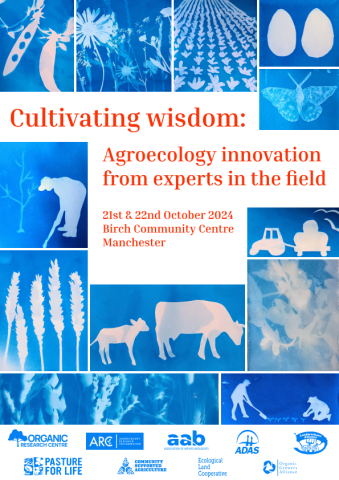This event is designed to be of interest to farmers seeking to know what research can offer, researchers aiming to connect with farmers or social scientists and economists who wish to better understand to wider societal and financial consequences of the adoption of agroecological practices.
Over the past two years the ARC has explored the potential impacts of on-farm research through the UKRI 'Community Knowledge Fund' project entitled 'Experts in Your Field'.
This event explores the specific impact of this project as well as drawing together those farmers, land managers, environmentalists and academics who are excited and/or curious by the potential of on-farm research. This event flips the format of most AAB-events by encouraging farmers to share/present the realities of on-farm research so that researchers can be better informed and both can work together to improve vital on-farm research
Why Attend?
- Discover how participatory research can directly improve farming practices.
- Learn from farmers as to how and why they have implemented on-farm research projects.
- Engage in discussion to gain new skills and fresh insights.
- Understand the invaluable insights and data that on-farm research can provide.
- Build meaningful cross-sector partnerships that facilitate future collaborative projects.
- Share your findings and receive feedback from the wider community.
- Understand the financial implications of adopting agroecological methods
The Value of On-Farm Participatory Research
On-farm participatory research is a collaborative approach that brings farmers and researchers together to conduct practical, field-based studies. This method not only ensures that research is relevant and immediately applicable but also empowers farmers with the knowledge and tools to make informed decisions about their farms.
This event includes plenary, breakout and poster sessions with an absolute premium on providing opportunities for discussion and networking. It is hosted at the Birch Community Centre in Manchester and catered by a Manchester Urban Diggers (MUD) based locally at Platt Fields Market Garden.
This will be a unique event to which we encourage academics, agronomists, social scientists, economists and on-farm workers to attend and share ideas.
Invited Speakers and Draft Schedule
The event will include 5 plenary sessions that will each be formatted depending of the participarting speakers These sessions will be a mix of short talks and panel discussions. In addition there will be an evening poster session and two breakout sessions that will involve in-depth discussions about three different relevant areas (TBC).
Invited Speakers
Lizzie Sagoo (ADAS): Mob Grazing
Ruth Wade (University of Leeds)
Lynn Tatnell (ADAS): Oper8 project about alternative weed control.
Daisy Martinez
Charlotte Bickler (Organic Research Centre)
Dominic Amos (Organic Arable)
Henny Lowth (AHDB) and participants from Innovative Farmers network
Tom Kemp (Working Woodlands Cornwall)
Daniel Farag (Director of Innovation and Practice, The Young Foundation)
Download Draft Schedule (PDF, August 25th)
Monday October 21st:
1000- Registration Opens
1015- Meeting Begins
1030- SESSION 1: Diverse Cropping Systems
1300- SESSION 2: Soil Health
1500- WORKSHOP SESSIONS
1600- SESSION 3: Co-Creation of On-Farm research
Tuesday October 22nd
0900- SESSION 4: Economics of Agroecology
1100- SESSION 5: Education and Diversity
1330- WORKSHOP SESSIONS
1445- SESSION 6: Biodiversity
Registration for in-person delegates closes on October 7th 2024
Registration for online delegates closes on October 21st 2024 (credit card payments only after October 7th 2024)
Contact AAB with any questions about the event



